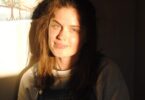They’re trying their best. So am I. It’s not enough.
“Okay, let’s just pause. Lake, I said pause! I need a second.”
The wind is driving snow into everything. Down my boots, up the cuffs of my jacket, under my toque. It’s giving unhinged prairie winter realness, the full sweat-inside-your-parka-while-your-nose-freezes-off-your-face experience. Someone’s taken an eraser to the road, the sky, the fields. Aside from our high beams burning into hopeless dark, the only landmark I can make out is a lonely string of Christmas lights strangling a bare tree at the edge of some nearby farm. Best guess, we’re somewhere past Tourond but not yet at the 311. I thought the 59 was our safest bet back to Winnipeg, but even the plows seem to be staying home tonight. It’s not actively snowing, but the wind has been howling over the flat, frozen ground for hours, scattering drifts across the highway. Most were small enough to careen on through, but this one must be a dozen metres thick at least, and we’re stuck smack dab in the middle of it. It’s the farm’s shelter belt that’s fucked us, protecting the approach to their yard at our expense.
I’ve tried all the tricks you learn as a country kid. Scooped away as much as I could around the car with the little collapsible shovel I keep in the trunk, stripped the floormats and wedged them beneath the front wheels for extra traction, got Lake to burn rubber while I pushed and pushed. We haven’t budged. They’ve already suggested we call my parents, twice, and I’ve responded, twice, that there’s no way in hell I’d give Ed and Tina the satisfaction. I can almost hear the chorus of relatives lining up at the house to dole out advice.
You gotta rock it back and forth! from Uncle Conrad.
A general declaration of disapproval from Opa Bergen. Young people these days. Do none of you own a tow rope?
You know my motto. Aunt Gloria chiming in from the kitchen. Never travel without sand, salt, or kitty litter from October to May!
That silent glance of judgement from Mom. I told you so. Will you listen to me now?
Tongues are sure to be wagging without us there. The Bothwell cheese and päpanät will be running low, so they’ll have to fuel themselves with gossip about Ed and Tina’s backwards boy and his strange ‘friend.’
“Lake?” Oma Bergen had asked, scrunching up her nose when they were introduced. “Did your mother really name you that?”
I told Lake I didn’t want to go to the family gathering, but they said it’d been two years of separate Christmases and we had to meet sometime. Might as well be now.
“We’ll go to Grunthal for a couple of hours, whup their asses at Dutch Blitz, come home with leftovers and everyone’s undying love and respect. Easy peasy, babe.”
They weren’t joking about Dutch Blitz. When I told them about my family’s obsession for the game, they bought a pack immediately and insisted we practice at home until their hands blurred across the table near as fast as Opa’s. But we didn’t get to cards at Ed and Tina’s. Barely got in the door before the whispers and stares began. Lake’s blue hair made Freedom Convoy Cousin Ron snort. Aunt Lina, the Winkler nurse who spent the pandemic posting anti-vaxxer memes on Facebook, pointedly asked if we’d heard of monkeypox before putting a lid on her casserole dish. Dad kept referring to Lake as “Luke” and huffed away from me the third time I corrected him on their pronouns. Even smiles and hugs weren’t to be trusted. You never knew when someone might tighten their grip and start trying to pray the gay away.
Mom said we could stay over when the weather took a turn, me in my old room and Lake in the basement, but I wasn’t having it. I knew how to handle myself in a whiteout. It was a sleepover in Grunthal that scared the shit out of me.
So here I am. Ragged breath becoming beard ice. Fingers numb inside my gloves. Can’t stay out here much longer. Can’t run the car all night. Can’t leave it in the middle of the road. What the fuck are we going to do?
“Love?” Lake is beside me, hazard lights reflected in the convex obsidian of their iris. On. Off. On. Off. Caution, difficult conditions ahead. Somehow they make themself heard above the wind without shouting. “I know it’s been a rough day, but this might not be something we can deal with on our own. We might have to make a call.”
I know I should swallow my pride. Accept Ed and Tina’s help with all the strings that come attached. Another thinly veiled sermon on the ride back to their place. A pointed prayer at the breakfast table. The lingering chill from our goodbyes. For pacifists, they sure have a lot of weapons in their arsenal. Looks, words, Bible verses, tears. Ever since I moved to the city and came out, we keep having the same conversation no matter what we talk about. Car trouble? Acting on homosexual impulses is a choice. Taxes reassessed? You are living in sin. Had a nice, uncomplicated weekend in the Whiteshell with chosen family instead of coming home for Thanksgiving? We raised you better than this. I dug a tailings pond in my chest a long time ago to hold all the ways I’ve disappointed my parents, but I think it’s finally filled up. If I have to see them again tonight, I might not be able to hold back the acid wave that longs to swallow the bridge between us.
“Lake, I—”
The lights of a vehicle pierce the gloom to our left. A pickup truck with a plow attachment makes its way down the lane of the farm and stops at the edge of our drift.
“You folks need a hand?” the driver asks.
“Yes!” we both shout.
The man steps out of his truck to survey the situation, adopting the same confident, wide-legged stance that men in my family have employed around the farm, the grill, and the coffee station at church for generations. He could easily pass for one of my uncles. Same icy slough eyes. Same lodged wheat hair. Do the similarities extend to his politics, I wonder?
“Well!” he declares. “You’re in a bit of a pickle there, hey? Don’t worry. We can sort it.”
The truck gets to work. We’re freed in fifteen minutes.
“Thank you,” I tell our rescuer. “That’s much appreciated. You have a good night.”
“Wait a minute, now. Where you headed?”
“Just the city.”
The man shakes his head.
“Not tonight, you’re not. Winds won’t die down til morning. Roads’ll be this bad or worse all the way to the Perimeter. Better stay put yet. We’ve got a spare room. You’re welcome to it.”
I eye the Wiens Poultry logo on the truck’s door. Our new friend hasn’t noticed the Protect Trans Kids sticker on our back bumper. Will the offer still stand if he does?
“It’s okay,” I try. “We’ve got snow tires.”
“And how’s that working out for you?” he asks with a chuckle. “Come on now. Wouldn’t hear the end of it from my Jess if I let you leave in weather like this.”
Lake and I exchange a look. The making-nice-with-a-Menno-farmer-for-a-night-beats-freezing-to-death look.
We follow him into his yard, brainstorming contingency plans on the fly.
“If we spot any PPC paraphernalia, we bounce,” I say.
“Definitely,” Lake agrees. “But if they have any cream cookies like your Oma’s, I’m stealing some for the car first.”
We are not greeted by a framed photo of Maxime Bernier in the coat room, nor by that portrait of laughing Obi-Wan Kenobi Jesus half my family seems to have in their living rooms. Instead, the farmer walks us into the kitchen where another man is sitting at the table in an old flower apron, cutting circles out of vereniki dough with the rim of a canning jar lid.
“You were right Jess. They definitely needed the help.”
“Say that again,” says the man at the table, stuffing a dumpling with a gloopy spoonful of egg and cottage cheese.
“What? You were right?”
“There!” Jess smiles in our direction. “You’re my witnesses. Don’t let him forget he said that.”
Our rescuer laughs and bends down. The two men kiss, and definitely not in the greetings-my-brother-in-Christ kind of way.
“Our friends are going to be staying the night. Sorry, I didn’t catch your—” He turns to ask our names, but the question turns into a bark of laughter when he spots the stunned look on my face. “What? You think you’re the only gay Mennonite to ever live?”
“Uh, queer. We identify as queer.” Is that all you can say?
“Sure, that too,” the man says, still smiling.
“How did you know?” Lake asks.
“That you were queer?”
“No, like, obviously.” They give a toss of their blue hair. “That he’s Mennonite?”
“You’re a Bergen, right?” the man says, looking at me.
My hands fly into the air.
“Guilty! I grew up in Grunthal.” I exaggerate my Menno accent to pronounce it without the ‘h.’
“Thought so. I think I played ball with some of your uncles growing up. You look just like them.”
“Oba nä.”
“Ho but for sure yet!”
Now we’re both laughing.
“You know how to make vereniki?” Jess asks. “I’m using this Mennonite Girls Can Cook recipe that makes like twelve dozen. Trying to get these frozen for New Year’s. Dan and I always have a big crowd over. We call it our chosen family gathering.”
“Twelve dozen? I guess Menno queers can cook too,” Lake quips. “I’ve never made them. Have you babe?”
“I’ve seen my Oma do it,” I say. “Once or twice.”
“Well then, time to get your hands dirty!” proclaims Jess. “Bathroom’s to the right. You can wash up there if you’re willing to help.”
Two minutes later I’m sitting across from Jess in a matching apron, trying and failing to pinch a bit of stuffed dough shut.
“What am I doing wrong?” I ask.
He checks my work over the top of his glasses.
“Size matters, darlin,” he says with a smirk. “You gotta use about half that filling.”
We go on like this for a while, filling Ziplocs with vereniki while we shoot the shit. Dan throws some shade at my uncles’ terrible batting averages. Jess cackles in delight when he realizes the super strict Home Ec teacher he used to prank in junior high was my mom. We play the Mennonite Game and figure out a few different ways the three of us are probably related. Lake sits there in happy silence, letting us have our inside jokes.
“I’m glad we came tonight,” they say, slipping a floury hand in mine as Dan and Jess take the last bags of vereniki down to their basement freezer.
“Me too.”
“We should get their numbers. Try to see them again.”
“Oh, I don’t know. I don’t want to bother them.”
“Love, you’re not bothering. These are your people. We just made dumplings together for like two hours. I’m sure they’d be down for another hangout.”
“Could we just see how this evening goes first? I don’t want to wear out our welcome.”
It both scares and thrills me, the possibility of friendship with these people. Like watching a coming storm fill the prairie sky. What would it feel like to hold the truth of who we are and where we come from with cupped hands instead of two closed fists? To view our shared identities not as a contradiction, but a dazzling alchemy worth celebrating?
“Thanks again for your help,” Jess says as he and Dan emerge from the basement steps. “Would have been up all hours otherwise.”
“No, thank you guys,” I say. “Really, we would have been lost without you.”
“Of course! We’re happy to have you. Your room is down the hall on the left if you’d like to hit the hay, but the chickens are all taken care of for the night. We’d have time for cards or something before bed, hey hun?”
“Sure, I could do a quick game. You folks know how to play Dutch Blitz?”
Lake’s eyes light up.
“I thought you’d never ask!”
It’s all over in a handful of rounds. “This Englisher smoked us like foarmaworscht!” Jess teases Lake.
In the morning, Dan checks 511 and gives us the All Clear. We leave with a flat of eggs and a dozen vereniki nestled in the trunk, two new numbers in our phones, and the promise of a rematch on New Year’s.
 K.R. Byggdin is the author of Wonder World (Enfield & Wizenty 2022), a ReLit Award finalist and winner of the Thomas Raddall Atlantic Fiction Award. Their writing has appeared in journals and anthologies across Canada, the UK, and New Zealand. Born and raised on the Prairies, they currently divide their time between Halifax and Toronto as an MFA candidate at the University of Guelph.
K.R. Byggdin is the author of Wonder World (Enfield & Wizenty 2022), a ReLit Award finalist and winner of the Thomas Raddall Atlantic Fiction Award. Their writing has appeared in journals and anthologies across Canada, the UK, and New Zealand. Born and raised on the Prairies, they currently divide their time between Halifax and Toronto as an MFA candidate at the University of Guelph.






